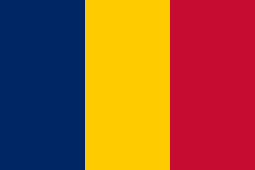Music of Chad
Chad is an ethnically diverse Central African country in Africa. Each of its regions has its own unique varieties of music and dance. The Fulani people, for example, use single-reeded flutes, while the ancient griot tradition uses five-string kinde and various kinds of horns, and the Tibesti region uses lutes and fiddles. Musical ensembles playing horns and trumpets such as the long royal trumpets known as "waza" or "kakaki" are used in coronations and other upper-class ceremonies throughout both Chad and Sudan.
| Part of a series on the |
| Culture of Chad |
|---|
 |
| History |
| People |
| Languages |
| Cuisine |
| Religion |
| Art |
| Literature |
|
Music and performing arts |
|
Media |
| Sport |
|
Monuments
|
|
Symbols |
The national anthem of Chad is "La Tchadienne," written in 1960 by Paul Villard and Louis Gidrol with help from Gidrol's student group.
Popular music
Following independence, Chad, like most other African countries, quickly began producing some popular music, primarily in a style similar to the soukous music of the Democratic Republic of the Congo.[1] Styles of Chadian popular music include sai, which used rhythms from the southern part of Chad—this style was popularized by a group called Tibesti. Other bands include the Sahel's International Challal and African Melody, while musicians include the Sudanese-music-influenced guitarist Ahmed Pecos and Chadian-French musician Clément Masdongar.[2]
Folk music
Teda music
The Teda live in the area around the Tibesti Mountains. Their folk music revolves around men's string instruments and women's vocal music. String instruments like the keleli are used to "speak for" male performers, since it is considered inappropriate for a man to sing in front of an adult woman.[3]
Instruments
Traditional Chadian instruments include the hu hu (string instrument with calabash loudspeakers), kakaki (a tin horn), maracas, lute, kinde (a bow harp) and various kinds of horns.[4] Other instruments include the flute and drums music of the Kanembu and the balaphone, whistle, harp and kodjo drums of the Sara people, while the Baguirmians are known for drum and zither music, as well as a folk dance in which a mock battle is conducted between dancers wielding large pestles.[2]
References
- "The Phat Planet World Music". May 13, 2006. Archived from the original on May 13, 2006.
- "Listing". www.cp-pc.ca. Archived from the original on 2006-10-01. Retrieved 2020-01-13.
- "Traditional Music of the Republic of Chad - Sound Clip - MSN Encarta". Archived from the original on 2009-08-29.
- "Virtual Chad: A look beyond the statistics into the realities of life in Chad, Africa". www.tchad.org.
External links
- Audio clips - traditional music of Chad. French National Library. Accessed November 25, 2010.
- MSN Encarta, downloadable folk sample (Archived 2009-11-01)